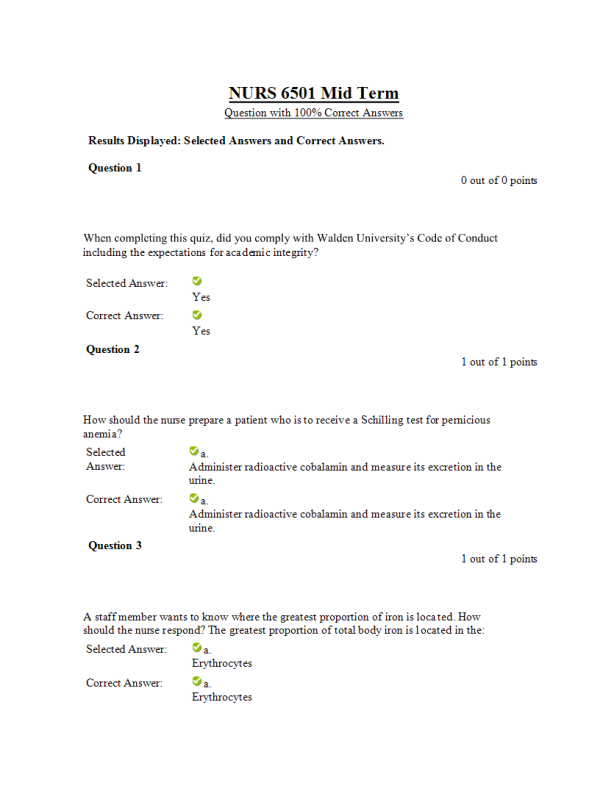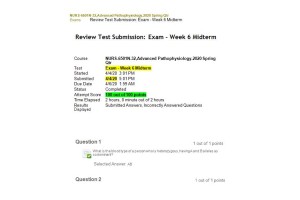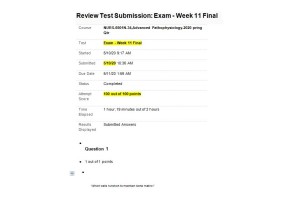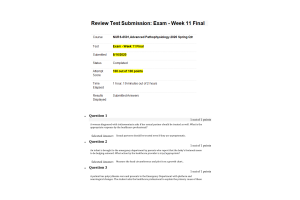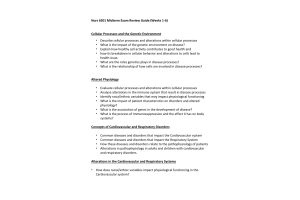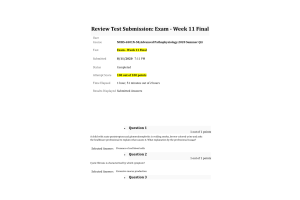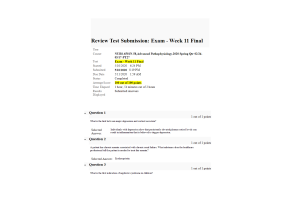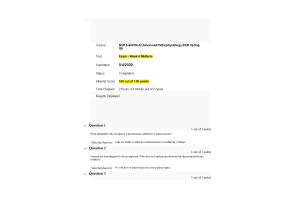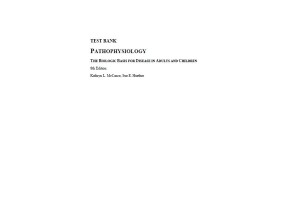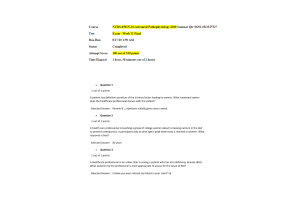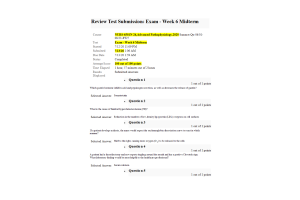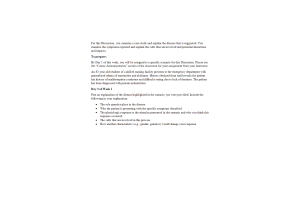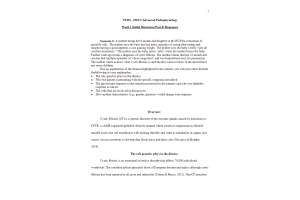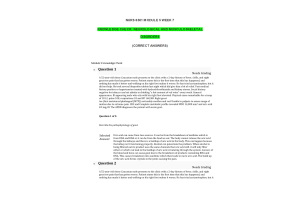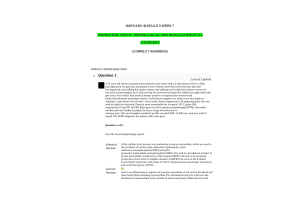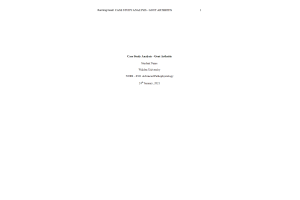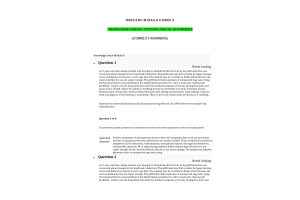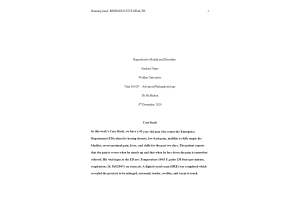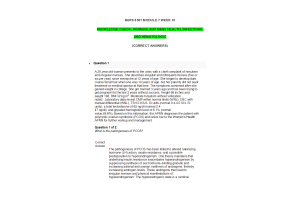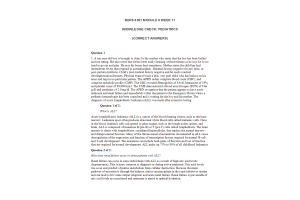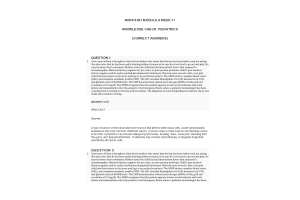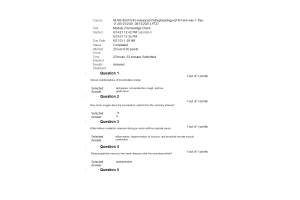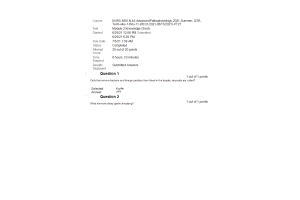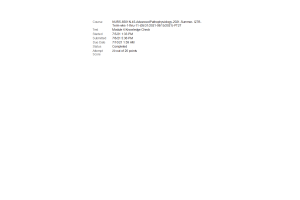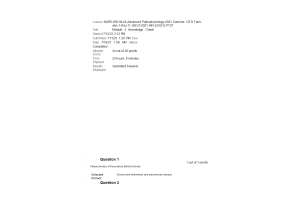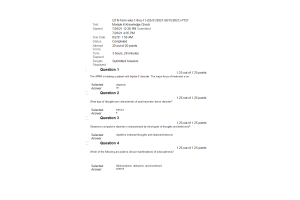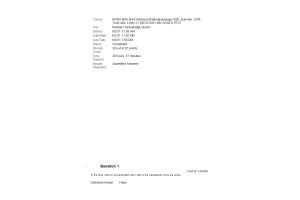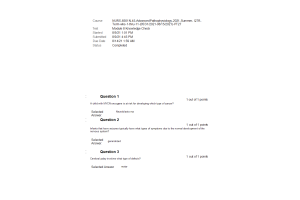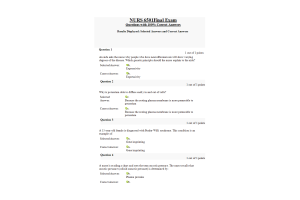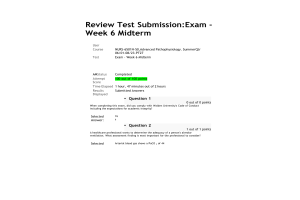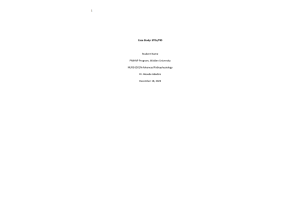NURS 6501 Week 6 Midterm Exam
- $39.00
- Question: When completing this quiz, did you comply with Walden University’s Code of Conduct including the expectations for academic integrity?
- Question: How should the nurse prepare a patient who is to receive a Schilling test for pernicious anemia?
- Question: A staff member wants to know where the greatest proportion of iron is located. How should the nurse respond? The greatest proportion of total body iron is located in the:
- Question: A 21-year-old female was recently diagnosed with iron deficiency anemia. In addition to fatigue and weakness, which of the following clinical signs and symptoms would she most likely exhibit?
- Question: The people from which country have the lowest risk for Hodgkin lymphoma?
- Question: During an infection, the nurse assesses the lymph nodes. Lymph nodes enlarge and become tender because:
- Question: A nurse monitors for the most common childhood cancer, which is:
- Question: A 35-year-old female is diagnosed with vitamin B12 deficiency anemia (pernicious anemia). How should the nurse respond when the patient asks what causes pernicious anemia? Adecreasein is the most likely cause.
- Question: The nurse will check which of the following tests to directly measure iron stores?
- Question: When a nurse is reviewing lab results and notices that the erythrocytes contain an abnormally low concentration of hemoglobin, the nurse calls these erythrocytes:
- Question: A 65-year-old male experienced loss of appetite, weight loss, lemon-yellow skin, liver
enlargement, and a beefy red tongue shortly before his death. Autopsy suggested pernicious anemia, and the cause of death would most likely reveal:
- Question: A 5-year-old male was diagnosed with normocytic-normochromic anemia. Which of the following anemias does the nurse suspect the patient has?
- Question: A 10-year-old male presents with abdominal swelling, night sweats, fever, and weight loss. He is diagnosed with Burkitt lymphoma. Upon obtaining the history, which of the following is the most likely cause?
- Question: A 62-year-old female tells her health care provider she has been experiencing regular night sweats that cause her to wake up drenched. She also remarks that she has been unintentionally losing weight. Physical exam reveals enlarged lymph nodes on her neck that do not appear to be painful. She should be screened for which of the following cancers?
- Question: An adult patient’s blood sample is analyzed in a laboratory. Assuming a normal sample, which type of white blood cell accounts for the highest percentage?
- Question: A 52-year-old male IV drug user was diagnosed with hepatitis C 5 years ago. He is now experiencing impaired blood clotting. The nurse suspects a decrease in which of the following vitamins?
- Question: A newborn baby is diagnosed with a blood disorder in which her platelet count is low. Which of the following does the nurse suspect could be the reason?
- Question: A 15-year-old male is diagnosed with infectious mononucleosis. When the patient asks how he got this disease, how should the nurse respond? The most likely cause is:
- Question: A 45-year-old female undergoes a splenectomy to remove a tumor. Which of the following assessment finding is most likely to occur following surgery?
- Question: After initial compensation, what hemodynamic change should the nurse monitor for in a patient who has a reduction in the number of circulating erythrocytes?
- Question: A50-year-oldfemaleisdiagnosedwithprimarythrombocythemia.Anursewouldexpect the blood smeartoreveal platelets.
- Question: A nurse is teaching the staff about platelets. Which information should the nurse include? In addition to playing a role in hemostasis, platelets have the ability to:
- Question: A 60-year-old female emphysema patient experiences a rapid and pounding heart, dizziness, and fatigue with exertion. Which of the following respiratory assessment findings indicate the respiratory system is compensating for the increased oxygen demand?
- Question: A 25-year-old female has a heavy menses during which she loses a profuse amount of blood. Which of the following adaptations should the nurse expect?
- Question: A newborn is diagnosed with congenital intrinsic factor deficiency. Which of the following types of anemia will the nurse see documented on the chart?
- Question: In disseminated intravascular coagulation (DIC), the nurse assesses for active bleeding after intravascular clotting because:
- Question: Thrombocytopenia maybe:
- Question: A 35-year-old male with hyperthyroidism begins treatment to decrease thyroid activity. A nurse monitors for which of the following conditions that could result secondary to the treatment?
- Question: A 20-year-old female undergoes lab testing for anemia. Results show high iron, bilirubin, and transferrin and low hemoglobin and hematocrit. Which of the following is the most likely diagnosis to be documented on the chart?
- Question: While reviewing lab results, the nurse recalls the most abundant cells in the bloodare:
- Question: While checking lab results, the nurse remembers the normal leukocyte count is:
- Question: A 45-year-old male is diagnosed with macrocytic, normochromic anemia. The nurse suspects the most likely cause of this condition is:
- Question: A 5-year-old female is diagnosed with acute leukemia. The nurse will most likely treat this patient with:
- Question: Which major symptom in a patient with sickle cell anemia indicates to the nurse, the patient is experiencing a vaso-occlusive crisis?
- Question: A nurse is caring for a patient who cannot clot. Which end product of the clotting cascade is this patient unable to make?
- Question: A 58-year-old female presents in the clinic presenting with fatigue, weight loss, and tingling in her fingers. Laboratory findings show low hemoglobin and hematocrit, a high mean corpuscular volume, and normal plasma iron. These assessment findings are consistent with which type of anemia?
- Question: A 3-year-old is making play cakes in a sandbox and is eating the play cakes. The sand was also being used by cats as a litter box and was contaminated with toxoplasmosis. Which of the following would most likely also be present?
- Question: An 8-year-old female presents with edema of the cutaneous and mucosal tissue layers. Her mother reports that the condition is recurrent and seems to occur more often during stressful situations. The child is diagnosed with hereditary angioedema. Which of the following is deficient in this child?
- Question: When the maternal immune system becomes sensitized against antigens expressed by the fetus, what type of immune reaction occurs?
- Question: A patient has a tissue growth that was diagnosed as cancer. Which of the following terms best describes this growth?
- Question: Stress induces sympathetic stimulation of the adrenal medulla. This causes the secretion of catecholamines, which include:
- Question: Duringinflammation,theliverisstimulatedtoreleaseplasmaproteins,collectivelyknownas:
- Question: A 5-month-old child is admitted to the hospital with recurring respiratory infections. A possible cause of this condition is:
- Question: A child fell off the swing and scraped the right knee. The injured area becomes painful. What else will the nurse observe upon assessment?
- Question: A 30-year-old male is having difficulty breathing and has been spitting blood. He reports that he beganexperiencingthisreactionaftercleaninghispigeons’cages.Testingrevealsheissuffering from allergic alveolitis. Which of the following is heexperiencing?
- Question: Which of the following individuals would be at greatest risk for an opportunisticinfection?
- Question: A 35-year-old male is diagnosed with lobar pneumonia (lung infection). Which of the following exudates would be present in highest concentration at the site of this advanced inflammatory response?
- Question: A 35-year-old male is diagnosed with a hormone-secreting tumor of the adrenal medulla. He experiences elevated blood pressure, pupil dilation, “goose bumps,” and increased anxiety. Which of the following hormones is the predominant one released by the tumor?
- Question: Which patient will develop active immunity? A patient who:
- Question: A 30-year-old female is diagnosed with cancer. Testing reveals that the cancer cells have spread to local lymph nodes. A nurse realizes this cancer would be documented as stage:
- Question: A45-year-oldmalepresentswithpersistent,severestomachpain.Testing revealsapepticulcer. Further laboratory tests reveal the presence of Helicobacter pylori. Which of the following is of concern for thispatient?
- Question: After teaching about stress, which information indicates a correct understanding of stress?
- Question: Which of the following hormones activates adrenergicreceptors?
- Question: A patient has a disease state that results from the secretion of toxins by bacteria. Which medical diagnosis will the nurse see documented on the chart?
- Question: Exhaustion occurs if stresscontinuesand is notsuccessful.
- Question: When a patient asks the nurse what hypersensitivity is, how should the nurse respond? Hypersensitivity is best defined as:
- Question: A 30-year-old male was diagnosed with HIV. Which of the following treatments would be most effective?
- Question: A patient presents with poison ivy on the extremities, face, and buttocks. This condition is an example of:
- Question: A 34-year-old female was recently diagnosed with RA. Physical examination revealed that inflammation started in the:
- Question: In discoid lupus erythematosus, skin lesions may be accompanied by Raynaud phenomenon, which is manifested by:
- Question: When trying to distinguish between an infectious disease and noninfectious disease, what is the hallmark symptom for most infectious diseases?
- Question: A 76-year-old female was diagnosed with osteoporosis by radiologic exam. She is at high risk for:
- Question: A 4-month-old female is diagnosed with atopic dermatitis (AD). Which of the following assessment findings by the nurse will most likely support this diagnosis?
- Question: When bacterial pathogens enter a patient’s body, they can defend themselves from an immune response by:
- Question: A 2-month-old female develops diaper dermatitis. A nurse will monitor this patient for which secondary infection that frequently accompanies diaper dermatitis?
- Question: Copy of A 5-year-old female was diagnosed with seropositive juvenile rheumatoid arthritis (RA). The treatment option for this disease is termed:
- Question: A 42-year-old female presents with raised red lesions with a brownish scale. She was diagnosed with discoid lupus erythematosus. A clinician recalls this disorder is related to:
- Question: A 50-year-old male recently underwent a liver transplant and is taking immunosuppressive drugs. He now has painful vesicular eruptions on the face and trunk. He reports that he had chickenpox as a child. Which of the following is the most likely diagnosis based on his chicken pox history?
- Question: When a nurse cares for a patient with systemic lupus erythematosus (SLE), the nurseremembers this disease is an exampleof:
- Question: The final stage of gout, characterized by crystalline deposits in cartilage, synovial membranes, and soft tissue, is called:
- Question: A 4-month-old male is brought to his primary care provider for severe itching and skin lesions. He is diagnosed with atopic dermatitis. Which of the following would be elevated in this patient?
- Question: Tinea corporis (ringworm)isa infection of theskin.
- Question: Researchers now believe that RA is:
